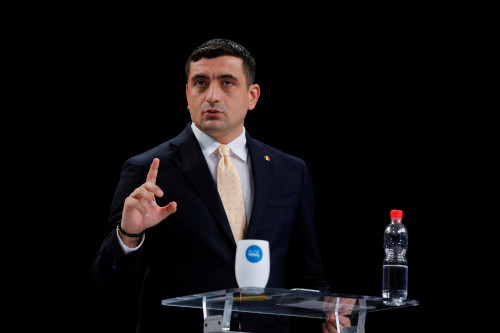
By Krisztina Than and Luiza Ilie
BUDAPEST/BUCHAREST (Reuters) – A pro-Trump hard-right lawmaker could win Sunday’s presidential election in Romania, while polls put two more MAGA-fans in second and third place in a Polish vote, amid a political shift in Central Europe that could widen rifts in the European Union.
George Simion, a nationalist who campaigns to “Make Romania Great Again”, opposes military aid to Ukraine and is critical of the EU’s leadership, decisively won the first round of the ballot on May 4. He has been ahead in most polls ahead of a May 18 run-off vote against centrist Bucharest Mayor Nicusor Dan, though the most recent survey put them neck-and-neck.
A Simion victory could destabilize the EU and NATO member and have repercussions also in the EU, especially when it comes to issues that require unanimity, diplomats and experts said.
“Simion’s election would mark a sea change in Romanian politics, creating significant risks to domestic stability, Bucharest-Brussels relations, and EU unity over Ukraine,” said Mujtaba Rahman, managing director for Europe at consultancy Eurasia Group.
If Simion wins, Hungary’s fiercely anti-immigrant leader Viktor Orban, a long-time Trump ally, and Slovakia’s Robert Fico – who both oppose military aid for Ukraine – could gain a new ally in the European Council in decisions on aid for Ukraine, energy, sanctions against Russia or the EU’s budget.
Their camp could grow further in October if a parliamentary election in the Czech Republic brings back eurosceptic former Prime Minister Andrej Babis, whose ANO party leads polls with 30-35% support.
‘COMMON NARRATIVE’
During a televised debate last week, Simion gave Orban a nod, despite their differences over Romania’s large ethnic Hungarian minority in Transylvania.
“I respect FIDESZ president and Hungarian Prime Minister Viktor Orban, many of his policies will be state policies in Romania too. Now is the time for a Europe of Christian nations,” Simion said.
He also endorsed Karol Nawrocki, backed by the nationalist Law and Justice (PiS) party, who trails Warsaw Mayor Rafal Trzaskowski in polls ahead of the first round of the presidential election in Poland on Sunday. On Tuesday, Simion went to Poland to attend Nawrocki’s rally, telling his supporters Trump was a “symbol of freedom”.
Slawomir Mentzen from the far-right Confederation party, also a Trump fan, is polling third.
Bulcsu Hunyadi, a specialist in right-wing populism at Political Capital, a Budapest think-tank, said the success of Trump and his MAGA movement had given momentum to nationalist politicians in the region.
“When it comes to criticism of the EU, criticism of the liberal globalist elites… that is a very common aspect of the narratives of these actors,” he said.
And U.S. conservatives have offered their support.
The American Conservative Union announced in March that it would hold the 2025 spin-off of its CPAC conference in Poland. Only Orban has hosted CPAC in Europe before.
The EU has grappled for years with Orban blocking key bits of legislation, while accusing him of undermining democratic values in Hungary – an allegation the veteran leader, who faces a tough election race in 2026, denies.
Having a larger group of hard-right leaders would be more difficult for the centrist majority in the EU to navigate, several diplomats said, at a time when the 27-member bloc faces unprecedented challenges, with tough tariff talks with Trump and a growing perceived threat from Russia.
One European official said there was a “constant threat in terms of policy making on foreign policy”, although noting that eastern Europe’s nationalists were not always a unified bloc.
IMMIGRATION AND COST OF LIVING
While former communist countries in Central Europe had embraced joining the EU from 2004 onwards, the hopes their citizens once had of catching up fast with the wealthier West have faded in recent years.
The COVID-19 pandemic and then the economic fallout from Russia’s invasion of Ukraine have slowed the region’s convergence. According to the European Central Bank’s June 2024 report, “since 2019 the catching-up process has stalled, or even reversed”.
Many Central Europeans feel they have lost out financially and their cost-of-living concerns fuelled sentiment against mainstream parties.
“The most important factor has been growing economic inequalities,” said Endre Borbath, a junior professor at the Ruprecht-Karls-Universität in Heidelberg, pointing out that in countries such as Romania the rapid development brought by EU funds had been concentrated in a few key regions.
Borbath also said the 2015 migration crisis – when around 1 million people, many fleeing Syria’s civil war, arrived in the EU – caught Eastern Europe’s conservative societies unprepared, which was fertile ground for stoking anti-immigration sentiment.
Florin, 47, a voter in Bucharest who declined to give his last name, said he would vote for Simion on Sunday and hoped he “closes the borders and restores Romania’s economy if it is still possible”.
“For those of us who were there in 1989, who caught a revolution – I was 13 at the time – absolutely nothing has happened. Everything is for them,” he said, referring to the political elite. “For us, the working class, nothing has been done.”
(Writing by Krisztina Than, Reporting by Luiza Ilie in Bucharest, Lili Bayer in Brussels, Alan Charlish in Warsaw, Jan Lopatka in Prague, Krisztina Fenyo in Budapest; additional reporting by Octav Ganea in Bucharest; Editing by Alex Richardson)







